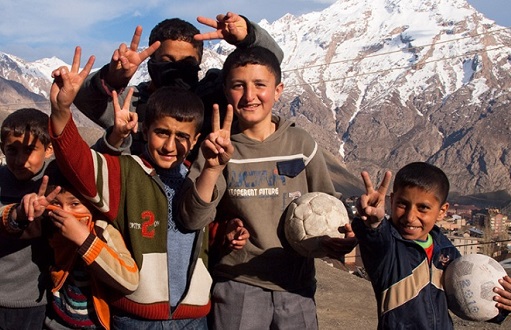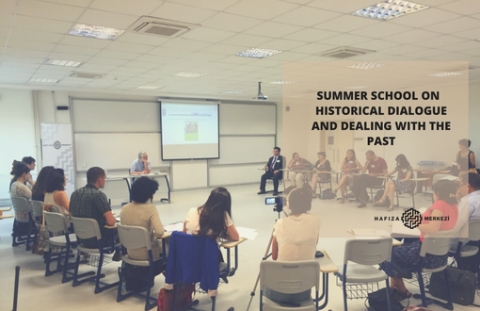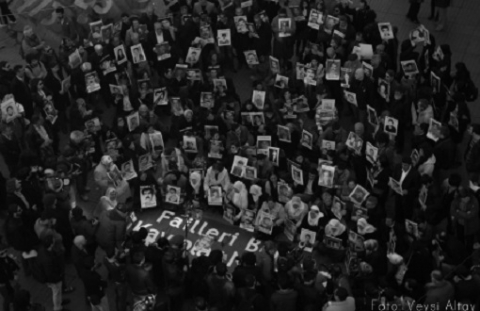
Özgür Sevgi Göral
In the past, discussions on ‘transitional justice’ in Turkey mostly revolved around the Kurdish issue that has a specific ethno-political nature. The perspective of transitional justice includes the totality of mechanisms that are put in place after wars, ethnic conflicts, coup d’états or any other occurrences or systems marked by systematic human rights violations, in order to resolve past experiences. These mechanisms are used to ensure that the state recognizes past experiences, atones and compensates victims for them.
Yet they are not merely state-oriented; transitional justice also means that different groups of society reckon with the political, cultural and humane legacy of the war, coups or other systematic human rights violations. The most important aspect of these mechanisms is that they need to be used and applied together, in totality.
For example, financial compensation that is given without recognizing the past can be regarded as “blood money,” and can thus have negative effects on reconciliation. These mechanisms consist of criminal prosecutions of perpetrators, truth commissions, museums and sites of conscience, institutional reforms, apologies, and compensation programs.
When discussing the Kurdish issue in Turkey, an argument generally used within Turkish right-wing discourse can strangely be heard often: “The Kurdish problem” is very distinctive; one that is not like any other ethnic conflict or war.
The claim that the circumstances in Turkey have specific conditions and results and that they cannot be understood through comparisons with other examples in the world has been conceptualized as sui generis. This emphasis on specificity and difference from other worldly examples has been repeated by all camps when discussing the Kurdish issue and the war in this light. Yet this emphasis brings to mind the “we are only like us” argument of the Turkish-right; even though not all remarks intend this message, it is hard to understand why concepts and approaches used around the world would not work within the context of the Kurdish issue.
At this point, I would like to diverge from such an approach and underline a few points. The Kurdish issue bears resemblance to many ethnic conflicts, wars and systematic rights violations around the world, and holds common characteristics with them. It is without doubt that just like every individual case, the Kurdish issue has various distinctive elements – just like in examples of Peru, South Africa and Argentina. However, these individualities should not prevent us from seeing the commonalities in all systematic human rights violations, conflicts and military coup d’états around the world. These commonalities may instigate us to observe in more detail the examples on how to reckon with the past after such processes and help us learn more from different experiences. In philosophical terms, seeing ourselves as an integral part of the common human experience, formulating associations with other experiences and critically filtering them can help us in deconstructing the idea of nationalism. Hence, within the context of the Kurdish issue, considering other examples will broaden our horizons and cultivate our understanding.
If we think in conjunction with other worldly examples, stories based on remembering, reminding and testimony in relation to reckoning with the past actually gained currency after World War II. In the post-Holocaust period, a type of remembering that may be defined as “melancholic remembering” developed out of verbal stories of violence and destruction told by first-hand witnesses. This melancholic style of remembering after World War II indicates two things: first, the fragmented nature of expressing past experiences in words; second, that no matter how much these stories are told, they can never fully explain the feeling of terror which rises out of these experiences. The fact that most of the people who shared their memories after World War II later committed suicide supports this melancholy and pessimism.
This pessimism could actually help us in understanding one dimension of melancholy that has permeated into the field of reckoning with the past. No matter how strong the processes of reckoning with the past and revealing the truths about past genocides, wars and systematic rights violations are, there will always be a part of these experiences that cannot be redeemed. There is no narrative, mechanism or compensation that can atone for an orphan’s experience of growing up without a father. Then maybe it is accurate to start by accepting this: No matter what is told, how often it is told, it is in fact not possible to absolutely resolve, atone for, or ideally reckon with such past experiences.
Nevertheless, narrating past experiences and circulating the stories of victims of cruelty opens up a crucial field in terms of reckoning with the past by challenging the official discourse. Remembering those who were forcibly disappeared means, before anything else, that the honour of victims’ is restored. When thinking about this in terms of the Kurdish issue, listening to the stories about people who were forcibly disappeared, executed and slaughtered is also a way to hear and understand a society’s mourning story. Acknowledging mourning, respecting loss and feeling sorrow for those who were killed is one of the fundamental prerequisites for living in unity. In that respect, the Peruvian Truth and Reconciliation Commission presents us with an interesting angle. This commission “has from the beginning, acknowledged oral evidence as a ‘therapy tool’ that is necessary for reconciliation; that is, in periods of transition, it is not sufficient to help civil society make peace with itself; it is also necessary to reconcile political logic with the logic of mourning”[1].
The proposal to combine political logic with the logic of mourning is at the same time a suggestion to construct new ways of remembering. Again, thinking within the context of the Kurdish issue, how should we, as citizens of the Republic of Turkey, remember what happened in the 90s, the Kurdish war, people who were forcibly disappeared and killed during this war? How should we create new methods and styles of recollection that are worthy of the gravity of such experiences? How are we going to be able to say that “The State cannot kill its citizens, no matter what they have done” to the citizens of this country? How are we going to deal with the political, social and moral consequences created by the war? How are we supposed to construct a new “conduct of remembering”?
I believe that in order to do this, it is necessary to document rights violations with reliable data first, then to patiently gather the stories of those who were victims of those violations and finally to share these findings in the most innovative way possible. Contrary to the recognition of the “let’s not make narratives of victimization” argument – which has become highly popular in Turkey in the last few years – I think that the extensive and multi-layered sufferings caused by the Kurdish war have not been, almost at all, narrated to different segments of society by those who experienced them. By saying this, I am surely not suggesting that the Kurdish public should be held responsible to tell the Turkish population about their experiences; but a documentation study concerning what happened, especially if it relies on testimony and remembering, generates anthropological data that is highly substantial and striking. I also see in the work we do at Hafıza Merkezi that this data has transformative power over people who have not heard anything but the language, discourse and the narrative of the state.
A large majority of the Turkish public has seen the war from the lenses of mainstream Turkish media, which acted as if it was a part of the war itself. Moreover, it was not only military or security institutions in its narrow definition that acted as an accomplice throughout this war; it was also the vast majority of other institutions that construct knowledge within society in different ways, such as universities, civil society organizations, strategy centres and judicial establishments. In the best-case scenario, they followed the strategy of silent avoidance. There was a very powerful and institutional collaboration behind the war and the state terror it created. Therefore, shameful practices of state violence were covered and rendered invisible. Throughout the war, Kurdish individuals’ bodies were devalued, transformed into bodies that could be exterminated and disappeared.
For that reason, documenting and gathering different narratives relating to such practices is crucial today. By circulating these narratives, it is possible to cross-examine different truths of the war period on different levels. Exploring new methods, fresh ideas and untried ways while doing so will pave the way for new encounters. It is important develop alternative educational workshops, artistic works and different approaches of remembering and activism, especially with younger generations who do not carry the burden of the war on their shoulders. With youth who has the possibility of being more ‘open’ than older generations, it is possible to create ways of knowing and acting; one that problematizes nationalism, relativizes the position of the state, and displaces mainstream modes of thought by deconstructing them. We just need to occupy ourselves with going beyond the established rules and gerontocratic structure of the human rights movement.
I believe that if Turkish youth hears the stories of relatives of the forcibly disappeared (like ones from Cizre; one of our areas of study), it is highly likely that their perceptions of war, being Turkish and Kurdish, of life, mercy, existence, forgiveness and resistance will change. I would like to borrow a concept which Tanıl Bora often emphasises in his writings: remembering past experiences also means that stories of “alternative heroes” are brought up. Revealing the stories of our alternative heroes against the heroes of nationalism, giving them credit or even aestheticizing them a little is needed. Remembering human rights advocates, scholars and relatives of the disappeared (who ‘opposed’ in the darkest periods of the 1990s) and sharing their stories will show young individuals that other ways of existence are possible. It gives hope; it carries the possibility and light of different existences.
On top of that, using the method of remembering and telling the stories of those who opposed injustices in reckoning with the past gives a moral message, as well as a political one. Remembering, gathering experiences, the idea of having someone left to narrate, reveals the promising side of the potentials of being human. Regardless of the extent of the atrocities, having someone to tell the story tells us important things about the nature of being human, memory, forgetting and experience. It gives hope for existence. In her book The Banality of Evil, which tells the story of the Nazi officer Adolf Eichmann’s trial process, Hannah Arendt summarizes the importance of remembering and having someone to tell the story to as such: “It is true that totalitarian domination tried to establish these holes of oblivion into which all deeds, good and evil, would disappear; but just as the Nazis’ feverish attempts, from June, 1942, on, to erase all traces of the massacres – through cremation, through burning in open pits, through the use of explosives and flame-throwers and bone-crushing machinery – were doomed to failure, so all efforts to let their opponents ‘disappear in silent anonymity’ were in vain. The holes of oblivion do not exist. Nothing human is that perfect, and there are simply too many people in the world to make oblivion possible. One man will always be left alive to tell the story. Hence, nothing can ever be ‘practically useless’, at least, not in the long run (…) For the lesson of such stories is simple and within everybody’s grasp. Politically speaking, it is that under conditions of terror most people will comply but some people will not, just as the lesson of the countries to which the Final Solution was proposed is that ‘it could happen’ in most places but it did not happen everywhere. Humanly speaking, no more is required, and no more can reasonably be asked, for this planet to remain a place fit for human habitation.” [2]
Remembering, as a way of reckoning with the past, is gaining importance in relation to the Kurdish issue; especially in the recent period after the negotiations between the two sides have started. Remembering, circulating perpetrators’ names, mourning for our loss, opposing the fact that the war criminals of the 90s now occupy prestigious positions within society, mean defining very different ways of victimization. If it is necessary to name things in order to understand what is going on, let us name them: The Republic of Turkey, as a state – just like Argentina, Guatemala, Morocco and Chile – implemented state terror practices in line with the war in the 1990s. These practices have not been sufficiently discussed or revealed, and those who are responsible have not been held accountable. Both the negotiation and the peace process that followed it mean that these practices should be revealed, perpetrators be punished and that state officials related to such crimes are removed from their posts. It also means remembering the victims of state terror, narrating their stories, feeling ashamed for the past, apologising and creating a new conduct of remembering. But why does the peace process mean all this? Because the fact that something happened once simply means that it can happen again. If we do not reckon with past experiences, it seems impossible to engender the most important motto of the field of reckoning: “Never Again!” Any massacre, genocide and war that was not reckoned with resulted in experiencing new ones, again and again, in a devastatingly circular way. It seems that there is no other way than remembering and telling stories in order to be able to say never again and to establish a world where none of these are experienced again.
*This article was published as part of the book Kürt Meselesinin Çözümüne İlişkin Algılar, Aktörler ve Süreç (Heinrich Böll Stiftung, 2013).
[1] Beatriz Sarlo, Geçmiş Zaman, Bellek Kültürü ve Özneye Dönüş Üzerine Bir Tartışma, Metis Yayınları, İstanbul, 2012, s. 45.
[2] Hannah Arendt, Eichmann in Jerusalem: A Report on the Banality of Evil, Penguin Books, New York, 1994, s. 232.



